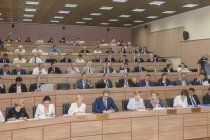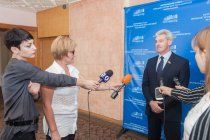 Русский
Русский English
English-







The Green Corridor for National Enterprises
More than 300 amendments to the Customs Code were adopted by the Supreme Council in final reading during today's plenary session. After it is signed by the President, an updated legislative act will appear in the legal framework of the republic, meeting modern requirements of international practice in the sphere of customs regulation.
Presenting the law-in-draft to colleagues on the deputy corps, deputy chairman of the Committee on Economic Policy, Budget and Finance Petr Pasat noted that the purpose of amendments to the customs legislation is to bring it in line with the norms of the Eurasian Customs Union. The legislative initiative of the Deputy of the Supreme Council, Alexander Korshunov, was introduced for consideration by lawmakers as early as 2014. Further work on it was suspended for a number of reasons.
Deputy Chairman of the State Customs Committee Alexey Lipovtsev took a direct part in the development of the document. Speaking at the plenary session, he emphasized that President Vadim Krasnoselsky instructed to fundamentally change the approach in the activities of customs authorities - from the administrative-punitive to the consultative and information. As a result, all the amendments proposed for inclusion in the Customs Code took into consideration the needs of economic agents.
According to one of the leaders of the State Customs Committee, the conceptual apparatus of customs legislation is brought into line with international rules, and the customs regimes prescribed in the document meet the needs of domestic participants in foreign economic activity. This will allow our business entities to move goods across the state border in a more favorable regime. In general, the adopted changes are aimed at simplifying the procedures for customs clearance of goods.
One of the novels of the Customs Code is a separate chapter establishing the rules for the movement of goods by individuals. Previously, this mechanism was regulated at the subordinate level. A separate section of the Code is dedicated to the status of customs authorities.
The discussion in the course of the plenary session raised the question of the rate of the customs fee. According to the law-in-draft, it was increased to 0.3 percent of the customs value of the goods being moved. Deputies expressed concern: the tariff increase will negatively affect the incomes of such large enterprises as MMZ, "Tirotex", etc. After voting for the rate increase, the parliamentarians did not rule out the possibility of its reduction in the future. Everything will depend on the dynamics of operations for import / export of goods, which, according to the Minister of Economic Development Sergei Obolonik shows growth today.




